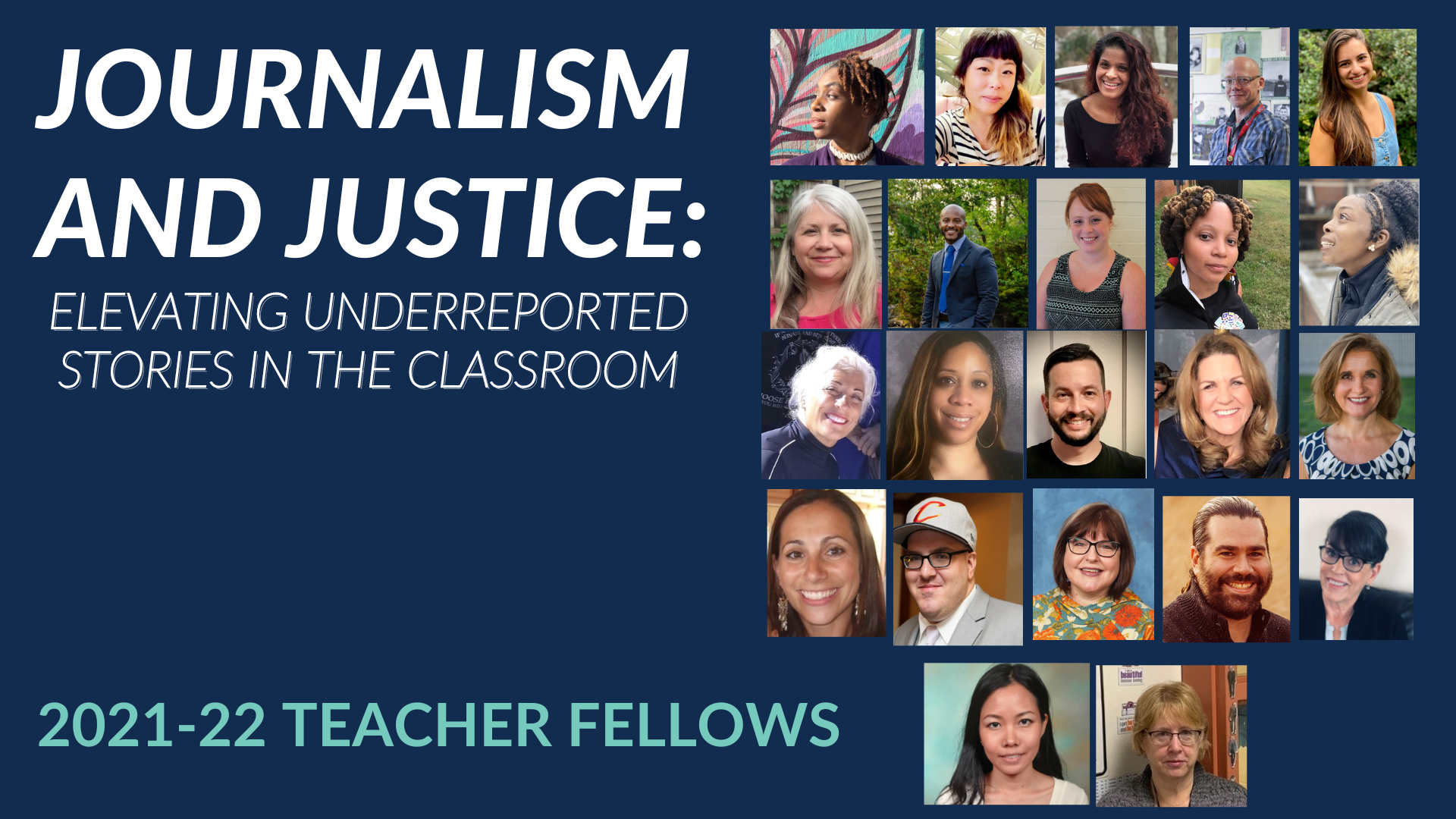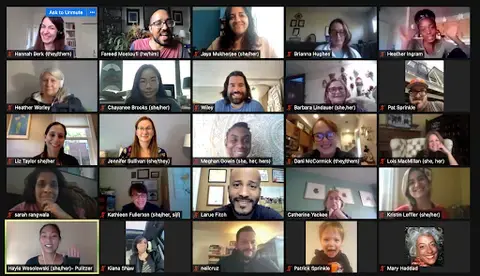
During the 2021-22 school year, 22 K-12 educators from across the country became a part of the Pulitzer Center Teacher Fellowship program: a paid, virtual opportunity that connects participants with award-winning journalists and the Pulitzer Center education team to create standards-aligned units. Fellows designed and implemented short unit plans that engaged their students in making local connections to global news, practicing media literacy skills, and building empathy. Fellows then implemented their short units, evaluated student outcomes, and shared their projects publicly through the Pulitzer Center's online lesson library and virtual professional development programs.
“This program serves to bring current and relevant issues into the classroom. More importantly, these resources serve to provide new ideas for our courses. The wide range of topics international, national, and local are applicable in multiple courses. These topics serve to help students understand the challenges faced by different communities and to empathize with individuals beyond their communities.” 2021-2022 Teacher Fellow who teaches history teacher in Chicago, IL.
Twenty-two educators from 11 states and the District of Columbia formed the 2021-22 cohort, “Journalism and Justice: Evaluating Underreported Stories in the Classroom.” Fellows met and collaborated as part of two communities: one for the eight educators teaching in Chicago, IL and one for educators teaching in other parts of the country. This year’s cohort supported students in grades 4-12 and youth participating in education programs at carceral facilities. Their courses included English Language Arts, Global Politics, African American History, Art, World Geography, Math, and more. Aiming to support their students to engage curiously, critically, and empathetically with the world through underreported global news stories, their unit plans ultimately reached over 2,639 students of all ages in spring 2022.
“The Pulitzer Teacher Fellowship not only connected me to the real-world, ongoing work of journalists, it also connected me to other talented educators from around the country in a time that has felt extra isolating. Through this program, my students took their inquiries and applied them to situations in our community, heard from journalists, and used critical thinking skills to develop arguments about current issues. This is what we need learning to be.” Kristin Leffler, 8th-grade Social Studies teacher in Portland, Maine.
Join us in celebrating the 2021-22 cohort, their Fellowship journeys, and final unit plans!
Fellowship Orientation and Structure:
“Education is liberation, empowerment, igniting the spark of curiosity and tending the flame of lifelong learning. Education is the tree under whose shade I will never sit, the sapling planted now is the vital component for justice, community engagement, empathy, and our shared humanity.” Kathleen Fullerton, project coordinator/educator supporting youth in correctional facilities in Portland, Oregon.
The cohort’s journey began in the Fall semester of 2021, during their first virtual gathering as Pulitzer Center Teacher Fellows on October 23, 2021. The meeting was held alongside Pulitzer Center education staff and Executive Editor Marina Walker Guevara. During orientation, the educators explored the core components of this year’s Fellowship theme: to examine systems of (in)justice by engaging with underreported news stories from diverse media platforms, explore media literacy skills, and connect with journalists who cover a variety of diverse, pressing global issues, from migration and racial justice to climate change and incarceration. They also connected with Teacher Fellowship alumni Stephanie Naegele and Jazmin Puicon for a discussion about the lasting impact of the program.

2021-22 Journalism and Justice Teacher Fellows connect with one another and the Pulitzer Center education team during their first meeting.
Following orientation, the group of educators participated in eight virtual evening workshops from October to January, to explore underreported news stories and connect with Center-supported journalists.
The first five workshop sessions involved Zoom seminars with award-winning journalists, evaluating a variety of underreported news stories, and discussing the importance of media literacy skills in education. Visiting journalists described their processes reporting on issues such as the environment and climate change, land rights, artificial intelligence, mass incarceration, migration, human rights, and global politics. Among this year’s guest speakers were PBS NewsHour correspondent Jane Ferguson, Rainforest Investigations Network fellow Yao Hua Law, WBEZ reporter Natalie Y. Moore, photojournalist Ana Maria Arévalo Gosen, and student reporting fellow Imran Mohammad Fazal Hoque.
Many Fellows introduced their students to the world of underreported stories via virtual journalist visits, inviting Pulitzer Center grantees to connect with their class to discuss their work, issues they’re passionate about, media literacy skills, and careers in journalism.

Fellow Jessica Lopez organized virtual visits with Imran Mohammad Fazal Hoque to each of her five English classes in Gulfport, MS. Lopez's students analyzed several texts by Hoque as part of a unit plan focused on narrative essays.
Fellow Barbara Lindauer’s high school world history class in Collinsville, IL met with Ukrainian journalist Misha Friedman, as he discussed the current conflict in Ukraine. The visit was even featured on St. Louis CBS affiliate KMOV.
Photojournalist Pablo Albarenga shared photojournalism skills and his reporting on rainforest defenders in the Amazon during a visit with Fellow Meghan Gowin’s fourth grade class in Forth Worth, TX, who worked on photo projects of their own.
The remaining four workshops focused on unit brainstorming and development, as well as discussing strategies and resources to engage students in the materials. Fellows were tasked with creating short units (three-10 class periods) with detailed lesson plans related to this year’s theme. The units were designed to inspire students to make local connections to global news stories and issues, as well as practice media literacy skills and build empathy. During the workshops, Fellows had the opportunity to give and receive peer feedback on drafts of their unit plans, before implementing the final version into their classrooms during the Spring 2022 semester.
Explore Fellows' Units
Fellows' Units and Student Work:
Though varying in theme focus, age group, and mediums, each unit touched on the Fellowship topic of justice within journalism, and weaved in Pulitzer Center reporting to further elevate underreported issues in the classroom. Student work produced from each unit was also widely diverse and included research projects, analytical and narrative essays, photography presentations, scriptwriting, poster and collage creation, interviews of local community members, poetry, photo essays, and more.
All unit plans above include examples of student work and downloadable PDFs that contain lesson plans, teaching materials, and evaluation rubrics. Take a look at some of the incredible student work created from these units below!
Image from a storyboard created by a student in Woodburn, OR during Charles Sanderson’s unit, “De Donde Yo Soy: Cultivating Stories of Hope, Pride, and …”
Image of students in Lawrenceville, GA presenting the results of their survey on racism in schools during Bethany Bryant’s unit, “How Can We Use Surveys to Advocate for Ourselves?”
A student in Chicago, IL interviews Alderman Roberto Maldonado to create a feature-length article on a local underreported story during Heather Worley’s unit, “Our World, Our Story - Investigating and crafting underreported stories in our communities”
Image of woodblock prints that uplift an underrepresented individual or group created during Jane Kang Lawrence’s unit, “Show Me Your Story: Amplifying Underreported Stories Through Printmaking” in New York City, NY
Image of a poster created by a student in Collinsville, IL during Barbara Lindauer’s unit, “Authoritarian Governments on the Rise: Could It Happen Here?”
Image of a student poetry project created in response to “Writing Saved Me” by Imran Mohammad Fazal Hoque during Lois MacMillan’s unit, “For Love of Humanity: Recording Underreported Stories for History” in Grants Pass, OR.
Image of student work from Dani McCormick’s unit, “Community Care Through Climate Justice” in Washington, D.C.
Image of a student collage from Liz Taylor’s unit, “Images from the Past, Images from the Present:
Black Excellence, Resistance, and Joy Yesterday and Today” in Philadelphia, PA.
Images of student artwork from Mary Haddad’s unit, “Agents of Change: Who Am I Among others?” in Chicago, IL.
Fellowship Closing and Reflections:
The Journalism and Justice cohort concluded their Fellowship with a virtual celebration on Saturday, May 21, 2022. Educators celebrated themselves, each other, and their final students during the program’s closing, while reflecting on the Fellowship experience.
Here’s what some of this year’s cohort had to say about their experience as a Pulitzer Center Teacher Fellow:
“The ability to do rich, meaningful, and deliberate work that can directly be used to enrich the lives of students is priceless. In addition, the opportunity to work with expert journalists and exceptional educators empowers me as a professional and inspires me to stay in the classroom." - Patrick Sprinkle, American History and Government teacher in New York City, New York.
“I loved this program. I felt that this was one of the best professional development experiences in my teaching career. Pulitzer resources are a permanent part of my curriculum.” - Catherine Yackee, Social Studies teacher in Chicago, IL.
“The connection through other fellows, educational specialists, and journalists really extend my students' scope of thinking that they will always remember as part of the authentic experience they had in school.” - Chayanee Brooks, high school English teacher in Pāhala, Hawai'i.
“I fully plan to continue this process next year as a result of being a Pulitzer Fellow. My students and I now know about a whole group of people -- the Rohingya -- that we did not even know existed. I cannot give enough thanks to the Pulitzer [Center] for allowing us to experience this.” - 2021-2022 Teacher Fellow who teaches English in Gulfport, Mississippi.
“The value of the program showed through showing my students issues that the larger community faces and not just Chicago and it connected us more to the global community. It allowed my students to see themselves in the world and not just as a kid who lives in Chicago.” - 2021-2022 Teacher Fellow who teaches fourth grade Literacy and Social Studies in Chicago, IL.
“The Pulitzer Center has the unique capacity to support educators in powerful ways that value their expertise, yet give them new tools, ideas, and capacities to improve their classroom practice and pedagogy.” - Charles Sanderson, Language Arts teacher in Woodburn, OR.
The Pulitzer Center is proud to share the hard work of these educators, and want to thank each Fellow for aiding in our mission to cultivate a more curious, informed, empathetic, and engaged public.
Explore Fellows' Units
Interested in becoming a Pulitzer Center Teacher Fellow? Apply to our next cohort! Applications for our next cohort will open September 7, 2022. Subscribe to our K-12 newsletter for more information on the application process, and learn more about the program here.









